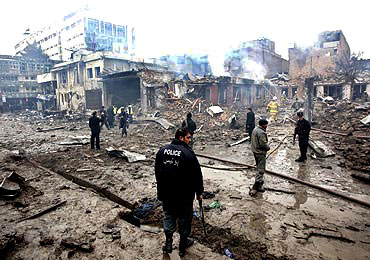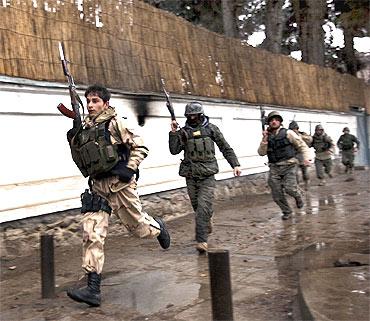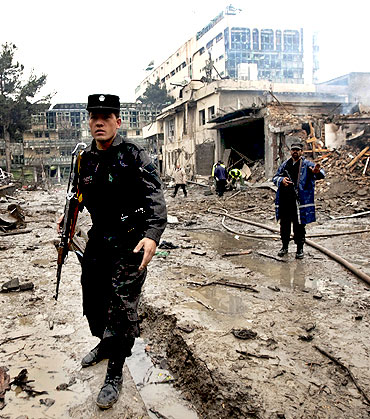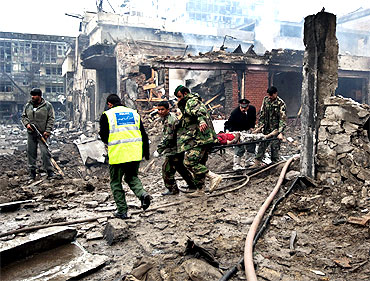 | « Back to article | Print this article |
6 Indians killed in 'barbaric' Kabul strike
In yet another attack on Indians in Afghanistan on Friday, Taliban terrorists targeted hotels, killing six Indians associated with developmental work in the country, including two Major rank army officers.
At least 10 others, including five Indian Army officers, were injured in a coordinated strike that killed 11 others, including locals and nationals from other countries.
The bombers, believed to be three in number, struck at the guesthouses, particularly at Park Residence, rented out by the Indian embassy for its staffers and those linked to India's developmental work in Afghanistan.
The deceased Indians were identified as Major Dr Laishram Jyotin Singh of Army Medical Corps, Major Deepak Yadav of Army Education Corps, engineer Bhola Ram, tabla player Nawab Khan, staffer of Kandahar Consulate Nitish Chibber and ITBP constable Roshan Lal, Indian embassy sources said.
Earlier, the government of India had put the number of those dead at nine, which highly placed sources said was incorrect as it was based on preliminary assessment of the Afghan interior ministry.
Jyotin Singh was in Afghanistan to train local doctors at the Indira Gandhi hospital while Deepak Yadav was teaching English at the Afghan Military Academy.
Nawab Khan, who was killed in the attack on Park Residence, was part of the three-member cultural troupe, which was sent by Indian Council for Cultural Relations to Afghanistan.
Bhola Ram was project director at Afghan Power Grid Corporation and was instrumental in bringing electricity to Kabul from Uzbekistan, sources said.
The project had been completed and Bhola Ram was in the process of handing over the responsibilities to Afghans for which they were being trained.
Indo-Tibetan Border Police constable Roshan Lal, 35, a resident of Himachal Pradesh was deployed as the security personnel at the Indian Consulate in Herat. He was on leave and in transit on his way back home.
Chibber was secretary at the Indian Consulate in Kandahar.
The Taliban claimed responsibility for the attack in telephone calls made to some foreign news wires.
The terrorists targeted those Indians who were engaged in helping Afghan people and building partnership between the two countries, Indian Ambassador Jayant Prasad said.
"It is the handiwork of enemies of Afghan people and friendship between people of India and Afghanistan," Prasad said.
Fourth attack on Indians in Kabul since July 2008
Describing it as a 'heinous terrorist attack,' External Affairs Minister S M Krishna said as per the preliminary information provided by the Afghan government officials, 'up to nine Indians... have lost their lives.'
"A few Indians have been injured, most of whom are reported to be out of danger. Arrangements are being made for their adequate and expeditious treatment, if necessary, by evacuating them to India," he said in a statement.
The Indians, who died in the incident included embassy staffers from consulates in Herat and Kandahar, a member of a medical mission and government officials, embassy sources said without giving their identity or breakup.
This is the fourth attack targeted at Indians in Kabul since July 2008 when 60 people, including four Indian embassy officials, were killed in a massive car bomb attack on the embassy building.
India and Afghanistan had pointed the finger at Pakistan for the July 2008 attack on the embassy, with reports suggesting that the Haqqani network had carried out the strike.
Strongly condemning the attack, Afghan President Hamid Karzai said it would not be allowed to hurt Afghan-Indian relations.
"Attacks on Indian citizens will not affect relations between India and Afghanistan," he said.
'Attack was targeted at Indians'
In a statement, Karzai said he 'strongly condemns' the terrorist attacks that occurred targeting two guesthouses in central Kabul where most of the guests were Indians.
Krishna termed the attacks as 'barbaric' and a matter of 'deep concern' and said they were clearly aimed against the people of India and Afghanistan.
"These are the handiwork of those who are desperate to undermine the friendship between India and Afghanistan, and do not wish to see a strong, democratic and pluralistic Afghanistan," he said.
Kasaif, an employee of the Indian embassy staying at the guest-house, said the attack came in the early morning. "We locked our rooms and stayed inside as the premises was rocked by gunfire," he said.
A wounded Indian doctor, who was an eye-witness, said the 'suicide attack was targeted at Indians.'
"I was coming out, I found two-three dead bodies, then I locked myself up in the bathroom for three hours... Along with the firing the first car bomb exploded... the roof fell on my dead," he said from his hospital bed.
'Well planned and coordinated attack'
The explosions shook up the residence near the Kabul city centre as a car bomb flattened the nearby Hamid guesthouse and eye-witnesses saw dead bodies being carried out from the Park Residence.
Witnesses said the wave of attacks near the nine-storey shopping centre Safi Landmark Hotel created a one-metre deep crater.
They also said they saw suicide bombers at the site. In October last year, another massive suicide attack by the Taliban near the Indian embassy had killed 17 people and injured 69 others.
The AFP said the Taliban claimed responsibility for today's attack that was termed by police as a 'well-planned and coordinated attack.'
Attack to destabalise Indo-Afghan ties
It said at least three attackers armed with guns and explosives targeted the Park Residence and the smaller Aria guesthouse on a nearby side street.
"The first explosion took place in front of the Aria... targeting mostly doctors. Subsequently two terrorists, one wearing a suicide vest, entered the Park Residence," it quoted Kabul police chief General Abdul Rahman Rahman as saying.
After a shootout with the attackers, police stormed into a room where one bomber detonated his explosives, killing three police, Rahman said.
The second bomber was killed by police, Rahman added. The agency also quoted Afghan television network Tolo as saying that 12 Indian doctors were staying at one of the targeted guesthouses.




